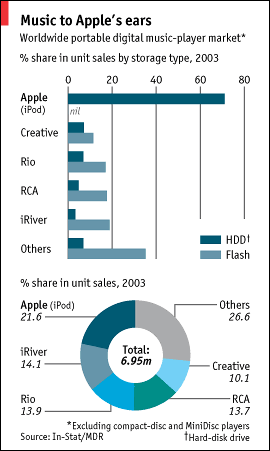가전기기 시장은 현재 포화상태이다. 그러나 소형 가전기기의 경우 2002년을 기점으로 새로운 영역으로의 시장 확대가 일어나고 있다. 그 저변에는 네트워크의 활성화로 노드들의 크기 보다는 노드의 성격에 의하여 정보 교환의 성향이 변하는 현재의 변화가 있다.
이러한 변화의 속도는 다양하며 광범위하다. 그러한 가운데 흥미있게 읽었던 다음의 기사는 The Economist에 게재된 소형 음악 재생기기인 Apple사의 iPod에 관한 내용을 담고 있다. 아래는 그 전문이다.
WHAT is the meaning of iPod? When Apple, a computer-maker, launched its pocket-sized music-player in October 2001, there was no shortage of sceptical answers. Critics pointed to its high price—at $399, the iPod cost far more than rival music players—and to the difficulty Apple would have competing in the cut-throat consumer-electronics market. Worse, Apple launched the iPod in the depths of a technology slump. Internet discussion boards buzzed with jokes that its name stood for “idiots price our devices” or “I prefer old-fashioned discs.”
Such criticisms were quickly proven wrong. The iPod is now the most popular and fashionable digital music-player on the market, which Apple leads (see chart). Apple has been unable to meet demand for the latest model, the iPod mini. On the streets and underground trains of New York, San Francisco and London, iPod users (identifiable by the device's characteristic white headphone leads) are ubiquitous. Fashion houses make iPod cases; pop stars wear iPods in their videos. The iPod is a hit.
Its success depends on many factors, but the most important is its vast storage capacity. The first model contained a five gigabyte hard disk, capable of holding over 1,000 songs. The latest models, with 40 gigabyte drives, can hold 10,000. Before the iPod, most digital music players used flash-memory chips to store music, which limited their capacity to a few dozen songs at best. Apple correctly bet that many people would pay more for the far larger capacity of a hard disk. Apple's nifty iTunes software, and the launch of the iTunes Music Store, from which music can be downloaded for $0.99 per track, also boosted the iPod's fortunes.

It is easy to dismiss the iPod as a fad and its fanatical users as members of a gadget-obsessed cult. But the 3m or so iPod users worldwide are an informative minority, because hard-disk-based, iPod-like devices are the future of portable music. According to In-Stat/MDR, a market-research firm, iPods account for 22% of digital music-players overall, but 71% of hard-disk-based players (see chart), the fastest-growing segment: over the next five years their sales will grow by 45% a year, overtaking flash-based players during 2005. So what iPod users do today, the rest of us will do tomorrow. Their experience shows how digital music-players will transform the consumption of music.
Professor iPod speaks
Few people know more about the behaviour of iPod users than Michael Bull, a specialist in the cultural impact of technology at the University of Sussex in England. Having previously studied the impact of the cassette-based Sony Walkman, he is now surveying hundreds of iPod users. Their consumption of music, he says, changes in three main ways.
The first and most important is that the iPod grants them far more control over how and where they listen to their music. Surely, you might ask, an iPod is no different from a cassette or CD-based player, since you can always carry a few tapes or discs with you? But most people, says Dr Bull, find that if none of the music they are carrying with them fits their mood, they prefer not to listen to music at all. The large capacity of a hard-disk-based player does away with this problem. The right music can always be summoned up depending on your mood, the time of day, and your activity, says Dr Bull. As a result, iPod users tend to listen to particular music during specific journeys or activities, such as commuting to work or jogging.
By granting them control over their environment—the audible environment, at least—the iPod allows its users to escape into their own little private bubbles. When standing in line at the airport, or waiting for a late train, iPod users feel that not everything, at least, is out of their control. They are also, says Dr Bull, far more selective about answering their mobile phones. That suggests that adding phone functionality to the iPod would be a bad idea, since it would facilitate intrusion.
This does not mean the iPod is inherently anti-social, however. For its second effect is to make music consumption, a traditionally social activity, even more so. You can use your iPod as a jukebox at home, and the ability to carry your music collection with you means you can always play new tracks to your friends. Many iPod users compile special selections of tunes, or playlists, for family listening while in the car. Family members negotiate the contents of the playlist, so that Disney tunes end up juxtaposed with jazz and Justin Timberlake.
That leads to the third of the iPod's effects on music consumption. The ability to mix and match tracks in playlists unconstrained by the limitations of vinyl records or CDs could undermine the notion of the album as a coherent collection of music. Musicians can still make albums if they want to, of course. But with music sold online on a track-by-track basis, albums could suddenly look very old-fashioned, and singles might make a comeback.
Are video iPods next? Strikingly, none of these shifts in usage patterns applies to video. People do not watch movies while walking the dog, make playlists of their favourite movie scenes, or clamour to buy individual scenes online. Portable video-players, which are already starting to become available, undoubtedly have their uses, such as providing entertainment during long journeys. But they seem unlikely to be the kind of industry-changing products that the iPod and its imitators have unexpectedly proven to be.







